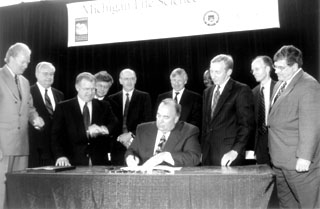The University Record, August 16, 1999 By Janet Mendler
News and Information Services

On an embryo of a Grand Rapids research facility, Michigan Gov. John Engler last month signed legislation that directs about $1 billion of the state’s tobacco settlement money toward collaborative research in biotechnology over the next 20 years.
Flanked by state legislators, the head of the Michigan Economic Development Corp., and presidents of the state’s three major research universities and of the under-construction Van Andel Institute, the governor called the “life sciences corridor” a collaboration that will make Michigan the leader in life-saving discoveries and technologies.
As hard-hatted construction workers ringed the ceremonial area, President Lee C. Bollinger said the hard work lies ahead, as researchers map the work at their respective institutions and determine what they can do collaboratively in what he called the life sciences league.
“And these efforts have to happen at the faculty level,” he said. Several U-M health sciences faculty, in Grand Rapids to attend a conference, were among the 75 people who attended the bill signing.
Peter McPherson, Michigan State University president, noted, “We need each other, for resources, for collective strengths that we don’t have individually.”
In addition to the state’s monetary commitment, Jay and Betty Van Andel, co-founders of the Amway Corp., have pledged $1 billion for the non-profit medical research institute, set to open next year.
These funds, coupled with the state’s contribution, can be leveraged in yet-to-be-envisioned ways, said Irvin D. Reid, president of Wayne State University.
Michael Brown, Nobel laureate and chair of the Van Andel Institute’s board of scientific advisers, said the corridor’s collaborative efforts have the potential for creating a whole new type of science.
“We can’t cure cancer, heart disease, Alzheimer’s or Parkinson’s in this century, but in the next century, the applications of science that are about to be made will lead us in ways to alleviate human suffering.”
From a business viewpoint, Doug Rothwell, president and chief executive officer of the Michigan Economic Development Corp., said that life sciences is going to be a growth industry in Michigan.
“The quality of science that benefits Michigan, and the world, is how we will ultimately judge this initiative,” said Rothwell.
“Wherever you have great science, great business always follows,” Brown added.
“I am extremely pleased by the state’s decision to fund the life sciences corridor. The research universities in Michigan all recognize that the life sciences are entering an era of significant transformation,” said Bollinger.

